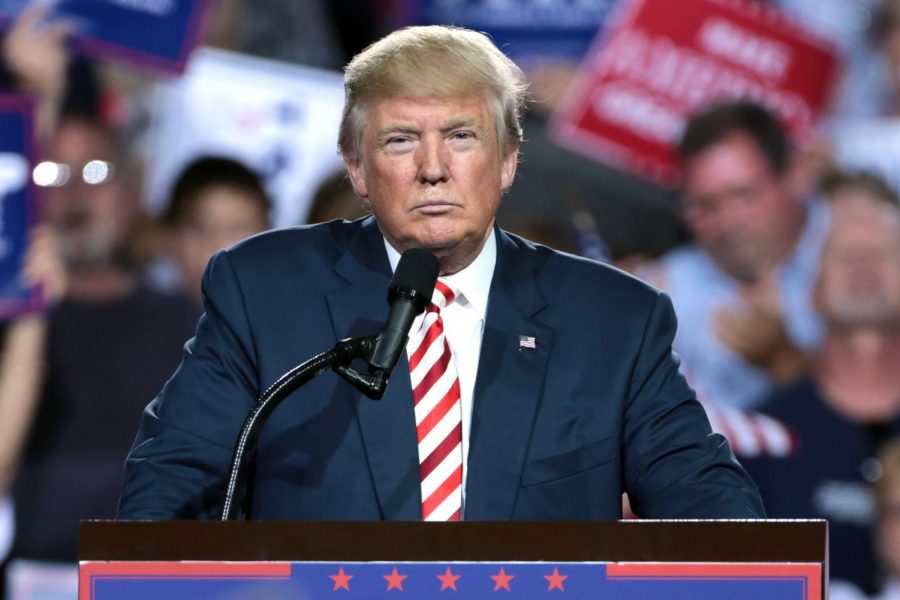A Historical Impeachment: What is it and how is it going to work?
Donald Trump left office yesterday due to his term ending. Impeachment proceedings have yet to be determined.
January 21, 2021
Only three presidents have ever been impeached since the U.S. Constitution was ratified in 1787. All three, Andrew Johnson, Bill Clinton, and Donald Trump, were acquitted and able to continue serving their terms in office.
Donald Trump, the former president of the United States, has made history as the first president ever to be impeached twice. The first time, he was acquitted on the House’s charges of abuse of power and obstruction of Congress. The Senate ruled that he was not guilty, and Trump continued to serve ever since.
Over a week ago, Trump was impeached again. The House gained a majority vote, 232 to 197, and impeached him for “inciting an insurrection.”
On Jan. 6, an angry mob of Trump supporters stormed the Capitol of the United States, where the Senate and the House of Representatives were ceremoniously counting the electoral votes to certify the 2020 presidential election and the victory of Joe Biden and Kamala Harris. Weeks before the insurrection, President Trump and other Republican politicians had been encouraging their supporters to “stop the steal.”
“Stop the steal” is in reference to the accusations of Trump’s supporters and the president himself that the outcome of the election of 2020 was fraudulent and that he was the actual winner. Lawmakers on both sides of the aisle have recognized that the inflammatory language of the president via social media and during a rally held hours before the riots incited the violent insurrection of the Capitol building. This serves as their reasoning behind impeachment.
Because of the controversy surrounding the election and the attack on the Capitol, there are mixed opinions on the impeachment vote.
Ryan Loiselle, a junior at Loy Norrix high school, does not think that President Trump should be impeached.
“It certainly doesn’t seem like they’re in the interests of the people,” Loiselle said, “Considering in the previous election, the most recorded voters turned up for an incumbent president. I think that should say something as to what the people think of President Trump.”
Yacine Lo, a sophomore at Loy Norrix high school, believes the opposite.
“His seditious acts against the country of inciting an insurrection as well as acts of domestic terrorism should not go unpunished,” Lo said. “He should be held accountable for his actions and this tragedy should serve as a warning that America will no longer tolerate the free reign of hate, in this case through the ideals of white supremacy.”
When a civil officer is impeached with a majority vote in the House of Representatives, they are not immediately removed from office. First, a trial in the Senate must find them guilty of the charges being brought forward. During the trial, the Senate serves as the jury, a select team of lawmakers from the House of Representatives act as the prosecuting attorneys, the chief justice of the Supreme Court oversees the trial, and the president is able to hire his own defense council. If two-thirds of the Senate votes to impeach the officer, then that person is removed from office.
Because Donald Trump is no longer president, his impeachment will not remove him from office, but instead he could face severe consequences that affect his political career, if the Senate decides he is guilty.
The Senate’s vote to convict him, however, would not cause any of these consequences. Another vote will follow the Senate trial, if they charge him, and decide whether or not Trump will be barred from holding future office. The Constitution is not clear on how many votes are needed for this to happen, but in the past it is suggested that a simple majority is what is necessary to stop him from running again.
“There was an act of insurrection perpetrated on the Capitol of the United States, incentivized by the president of the United States,” Nancy Pelosi, the Speaker of the United States House of Representatives, said. “One week later, Wednesday to Wednesday, that president was impeached in a bipartisan way by the House of Representatives — so urgent was the matter. They are now working on taking this to trial.”
Pelosi has yet to send the articles of impeachment to the Senate because when she does, the Senate must immediately begin the trial. The delay is expected to be short, and there is a possibility that the trial will begin just as the power is transferred to incoming president Joe Biden’s administration.
The Senate reconvened the day before the inauguration of now President Joe Biden and Vice President Kamala Harris, and the impeachment trial is likely to take place in the next 100 days.













